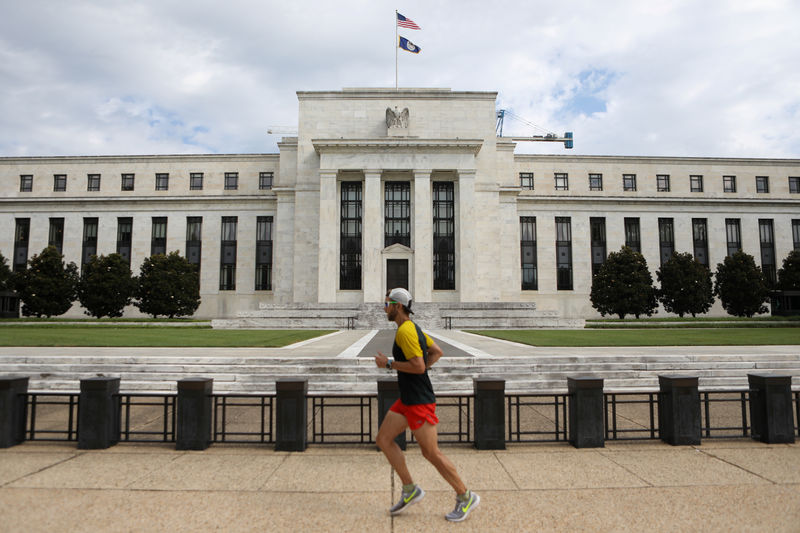(Bloomberg Opinion) -- All four living former chairs of the Federal Reserve took to the op-ed page of the Wall Street Journal on Monday to defend the bank’s independence. In doing so, they’ve given the current chair, Jerome Powell, invaluable cover to provide support to a U.S. economy buffeted by President Donald Trump’s trade war.
Nevertheless, Powell remains caught between the proverbial rock and hard place. Monetary economics tells him to cut interest rates aggressively to minimize the risk of a recession so close to the so-called zero lower bound. Political-choice economics, however, counsels more gradual cuts, so as to avoid even the appearance of lost independence.
At this point, why the Fed does something is just as important as what it does. And what it should do is to continue to cut rates — making it abundantly clear that it is doing so not to enable Trump’s trade war, but to contain the damage from it.
This distinction is not always apparent to outsiders. To help improve public understanding, Powell needs respected economists to both vouch for the wisdom of cuts now, and to reiterate the importance of Fed independence. The four Fed chairs addressed the latter issue on Monday, and Powell’s predecessor, Janet Yellen, made the case for immediate cuts last month. Allow me to elaborate on the rationale for cutting rates now.
Global growth is slowing, the U.S. economy has cooled from its breakneck pace of 2018, and inflation is low. Most crucially, however, the president’s erratic trade war is creating enormous uncertainty. In this type of environment, the prudent thing to do is to cut rates even before the first signs of recession.
Indeed, when interest rates are only a few percentage points from zero, as they are now, economic theory says the Fed ought to cut rates sooner than it would otherwise. That’s because the risks are asymmetrical.
If the Fed is too quick to cut rates, it risks stimulating the economy even when any apparent weakness was only temporary. In that case, the Fed can simply reverse course and raise interest rates to even higher levels than before. That will cause the economy to cool and inflation to drift back towards the Fed’s target.
If the Fed is too hesitant to cut rates, however, it risks falling behind the curve, trying to prop up an economy already sliding into recession. In that case, it would need to cut rates even more than expected. But rates can’t go below zero, so the Fed might have to resort to quantitative easing or other less well understood methods to jumpstart the economy.
This is the situation the Fed found itself in after the Great Recession, and it’s why, even though the recession officially ended in 2009, the economy did not start really start growing again until 2011.
Powell is well aware of all of this, but the trade war makes anything he does risky. The president has repeatedly complained that Powell is not helping him wage the trade war. In theory the Fed could do this by cutting rates and thereby weakening the dollar. A weaker dollar would make U.S. exports more competitive and the president’s tariffs more painful for China.
It gets worse: If the Fed cuts rates now, it may look as if it is attempting to boost the economy ahead of the election. What’s more, Trump has been hounding the Fed to cut rates almost since taking office, and by doing so Powell could open the Fed to charges that it is doing the president’s bidding.
This is the type of chicanery that politically compromised central banks are famous for: overstimulating the economy just before an election to help the incumbent party stay in power. Each time they do so, inflation creeps higher, until eventually it is out of control. As the four former chairs made clear, even the appearance of this kind of coordination can undermine public trust in the central bank.
So why are continued rate cuts still the better option? Quite simply, because the Fed’s mandate is to keep the U.S. economy stable. And the best way for the Fed to prove its independence is to focus on the economy.
Undoubtedly the Fed would like to ignore the trade war altogether. Alas, this is not an option. As Powell has said repeatedly, the trade war is one of the major threats to U.S. economic growth. The only option the Fed has, if the trade war escalates, is to cut rates faster — and to make sure the public understands why.
